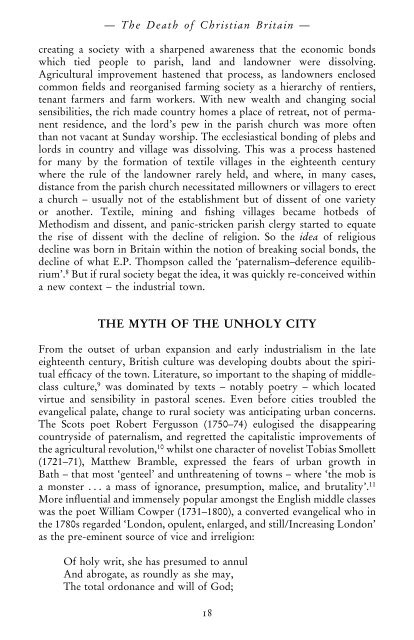The Death of Christian Britain
The Death of Christian Britain
The Death of Christian Britain
Create successful ePaper yourself
Turn your PDF publications into a flip-book with our unique Google optimized e-Paper software.
— <strong>The</strong> <strong>Death</strong> <strong>of</strong> <strong>Christian</strong> <strong>Britain</strong> —<br />
creating a society with a sharpened awareness that the economic bonds<br />
which tied people to parish, land and landowner were dissolving.<br />
Agricultural improvement hastened that process, as landowners enclosed<br />
common fields and reorganised farming society as a hierarchy <strong>of</strong> rentiers,<br />
tenant farmers and farm workers. With new wealth and changing social<br />
sensibilities, the rich made country homes a place <strong>of</strong> retreat, not <strong>of</strong> permanent<br />
residence, and the lord’s pew in the parish church was more <strong>of</strong>ten<br />
than not vacant at Sunday worship. <strong>The</strong> ecclesiastical bonding <strong>of</strong> plebs and<br />
lords in country and village was dissolving. This was a process hastened<br />
for many by the formation <strong>of</strong> textile villages in the eighteenth century<br />
where the rule <strong>of</strong> the landowner rarely held, and where, in many cases,<br />
distance from the parish church necessitated millowners or villagers to erect<br />
a church – usually not <strong>of</strong> the establishment but <strong>of</strong> dissent <strong>of</strong> one variety<br />
or another. Textile, mining and fishing villages became hotbeds <strong>of</strong><br />
Methodism and dissent, and panic-stricken parish clergy started to equate<br />
the rise <strong>of</strong> dissent with the decline <strong>of</strong> religion. So the idea <strong>of</strong> religious<br />
decline was born in <strong>Britain</strong> within the notion <strong>of</strong> breaking social bonds, the<br />
decline <strong>of</strong> what E.P. Thompson called the ‘paternalism–deference equilibrium’.<br />
8 But if rural society begat the idea, it was quickly re-conceived within<br />
a new context – the industrial town.<br />
THE MYTH OF THE UNHOLY CITY<br />
From the outset <strong>of</strong> urban expansion and early industrialism in the late<br />
eighteenth century, British culture was developing doubts about the spiritual<br />
efficacy <strong>of</strong> the town. Literature, so important to the shaping <strong>of</strong> middleclass<br />
culture, 9 was dominated by texts – notably poetry – which located<br />
virtue and sensibility in pastoral scenes. Even before cities troubled the<br />
evangelical palate, change to rural society was anticipating urban concerns.<br />
<strong>The</strong> Scots poet Robert Fergusson (1750–74) eulogised the disappearing<br />
countryside <strong>of</strong> paternalism, and regretted the capitalistic improvements <strong>of</strong><br />
the agricultural revolution, 10 whilst one character <strong>of</strong> novelist Tobias Smollett<br />
(1721–71), Matthew Bramble, expressed the fears <strong>of</strong> urban growth in<br />
Bath – that most ‘genteel’ and unthreatening <strong>of</strong> towns – where ‘the mob is<br />
a monster . . . a mass <strong>of</strong> ignorance, presumption, malice, and brutality’. 11<br />
More influential and immensely popular amongst the English middle classes<br />
was the poet William Cowper (1731–1800), a converted evangelical who in<br />
the 1780s regarded ‘London, opulent, enlarged, and still/Increasing London’<br />
as the pre-eminent source <strong>of</strong> vice and irreligion:<br />
Of holy writ, she has presumed to annul<br />
And abrogate, as roundly as she may,<br />
<strong>The</strong> total ordonance and will <strong>of</strong> God;<br />
18








